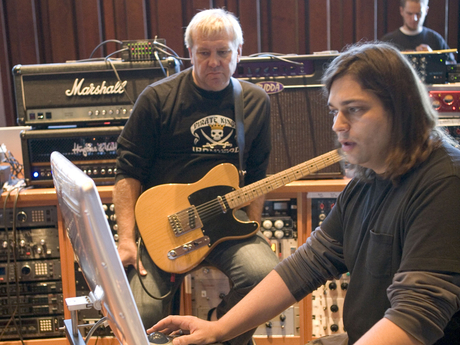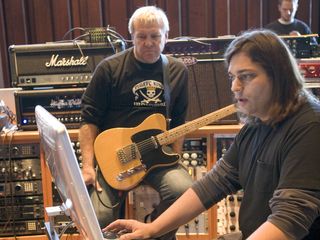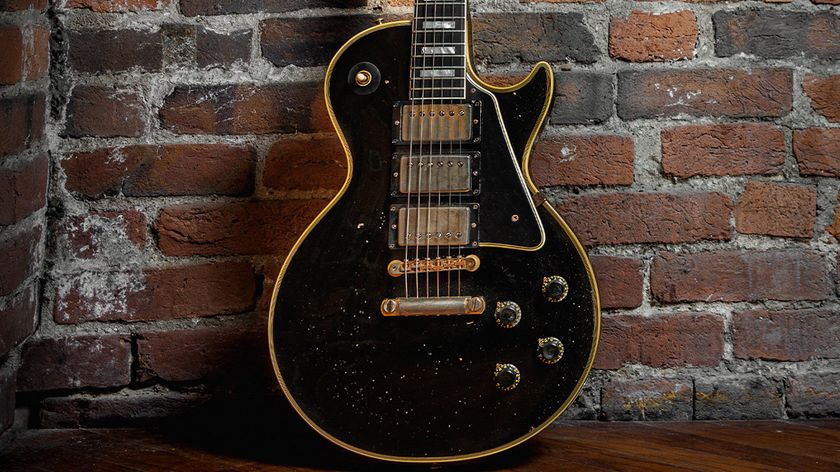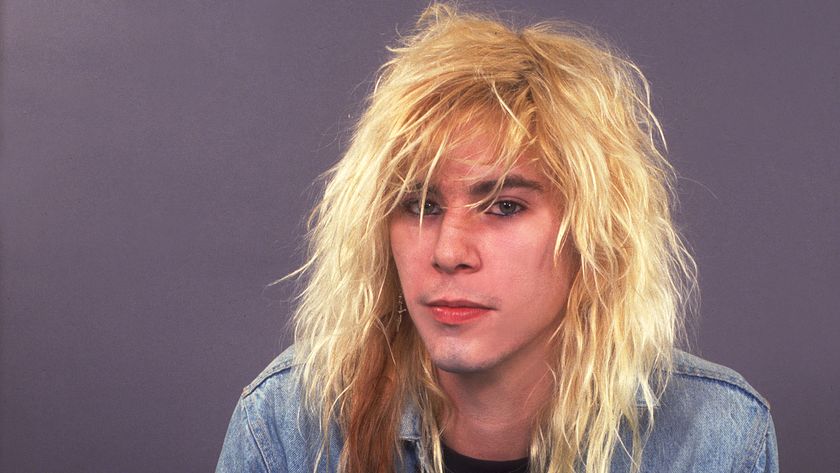

Rush's Alex Lifeson (left) works on a guitar track with producer Nick Raskulinecz.
Nick Raskulinecz admits it: he's an unabashed, over-the-top Rush fan. But although the Grammy-winning producer, known for his work with the Foo Fighters, Alice In Chains, the Deftones, Stone Sour and Evanescence, among others, considers himself among the Canadian power trio's most ardent admirers, when it comes time to sit behind the console (along with the band, Raskulinecz produced 2007's Snakes & Arrows and their upcoming, much-anticipated Clockwork Angels), he's all business.
"There a certain responsibility you have no matter what record you're producing," he says. "You want to help the band make the best record they possibly can, and with Rush, that can be a very tall order. Rush fans hold the band very dear to their hearts. You want to honor that, but you also want to push the band forward and allow them to be the best they can be right now."
He pauses slightly, then adds with a laugh, "Of course, that stops when we're done for the night. That's when I sit down with the guys and go, 'All right, let's talk about 1977!'"
The writing and tracking for Clockwork Angels took place over the course of three years, with Raskulinecz and Rush working first at Blackbird Studios in Nashville and then, for a longer stretch, at Toronto's Revolution Recording. During that second period, a concept, spearheaded by drummer and lyricist Neil Peart, emerged, resulting in a work that is, in many ways, a seamless synthesis of the group's late-'70s epics and a thoroughly modern stylistic approach.
In the following interview, Raskulinecz discusses the making of Clockwork Angels, an album that he proudly states thrills both the producer and fan in him equally. (Be sure to read our track-by-track review of the record right here.)
How would you say the recording of Clockwork Angels differed from Snakes & Arrows?
Get the MusicRadar Newsletter
Want all the hottest music and gear news, reviews, deals, features and more, direct to your inbox? Sign up here.
"When I got involved with Snakes & Arrows, I was coming in a little late for school. They had most of the album written already. A few songs were works in progress, but pretty much everything was there. So the lesson plan was in motion, and I helped facilitate what they were doing.
"This one we started from scratch. They didn't talk about doing a concept album - that came later. But when I sat down with them three years ago, I said, 'I want to hear unbridled Rush. I don't want to focus on three-and-a-half minute songs; I don't want verse, chorus, verse, chorus - none of that. I want you guys to play, no holds barred. Let's just make music.' And that's what we did."
How were the songs presented to you?
"Geddy and Alex made rough sketches. They'd do demos and send them to Neil and me, and we'd all talk about them. They'd send three or four songs, and then six or seven months would go by and they'd send a few more. They went on tour for a year and a half, and there were no songs. This album has been in the works for some time."
Did songs change much once you got in the studio with the band? Did they jam on them and discover new things?
"Well, I should mention that every song was born out of a jam. Geddy and Alex would sit in a room and jam with a click track or a simple drum beat. The songs were very different without Neil. So that was the first stage of the demos; the next demo stage was to get Neil on the songs.
"Songs constantly changed. Half of the album was written between 2008 and 2010. The second half was written in two weeks in the studio. While Neil and I were tracking drums on some of the finished songs, Geddy and Alex were down the hall working on the other ones."
What went into the decision to record some songs in Nashville and finish up in Toronto?
"Because they had to go out on tour, the plan was to pick the two songs that were the most developed. At that point, I think Neil had it in his mind that the record would be more of a concept. Caravan and Brought Up To Believe were the ones we picked - they felt the most done. I was working with Stone Sour, so I took a week off when Rush came down to Nashville to work on those two songs.
"After those tracks went to radio, we put the brakes on everything while the band toured. Once they were off the road, the guys took a few months to unwind. Geddy and Alex reconvened at Ged's place, where they got a couple of more songs together, and then we picked a start date and moved into the studio. We still didn't have the whole record even. Carnies, Wish Them Well, Headlong Flight, Seven Cities Of Gold, BU2B2 - those came later."
Was there any one way that the songs were tracked?
"We did them lots of ways. Some of it was them playing together, some of it was them playing individually, some of it was piece by piece. But all three of them were together throughout the entire process. For instance, we might get the bass and drums done, and then Alex and [engineer] Rich [Chycki] will go in one room and work on guitars while I'll go to another room with Ged to do vocals. Different things were happening all the time."
When was Neil's concept introduced, and how did it affect what everybody was doing?
"That really started to come to light in Toronto. Two weeks or so into it, as Geddy and Alex were writing more music, we all kind of looked at one another and said, 'Hey, this is really turning into something. It's tying together.' Then one day, Neil walked in the room and said, 'It's done. I finished it.'
"For the next 20 minutes, Neil talked about this vision he had for the concept of the record, and it was one of those moments I'll never forget. Listening to him, watching him speak - it was amazing! I wish we were filming him so we could put it on YouTube. And right there, the whole record just clicked. Once Geddy and Al heard where Neil was going, they churned out some amazing music. I think Headlong Flight came the next day."

Producer Raskulinecz says one of his chief goals for Clockwork Angels was "for Rush to be Rush." © Tim Mosenfelder/Corbis
Now, as a producer, how do you tell Rush that something they're doing isn't working, that it could be better?
"I do just that. I feel this music. I feel it in my heart. There were definitely moments when I had to walk in the room and tell Alex Lifeson that his guitar part could be better. There were other times I would stand in the drum room with Neil - I had a drumstick in my hand - and I'd talk to him about certain fills and licks. Same thing with Geddy - I just did it.
"Yes, I'm a Rush fan - I fucking love Rush - but if I let that get in the way, I'm not doing my job. I can't let that taint my objectivity as a producer. Sometimes it's hard, especially when you become friends. Things get more emotional when you know the guys. But you have to do what you're supposed to do, with the right amount of passion.
"The bottom line is that, as a producer, you know in your gut when something is right or wrong. You don't have to think about it too much. You just know."
Were there any notable changes to the band's gear from the last record?
"Not too much. We used Neil's DW touring kit, the one he played on the Time Machine tour. That thing sounds amazing! Guitar-wise, we raided Alex's collection, all of his old guitars and a few of his new Gibson signature models. Those things sound great. Alex played them for a few of his solos. For amps, I remember we used an old Marshall Plexi - there were a few Marshalls, really. We also used some Voxes, Hughes & Kettners, Bogners… a few different things.
"Geddy… he used his Orange amps. You know what we did use on this album that was different from the last one? The Moog Taurus 3 pedals. On the last record, we used the original T-1s that they had in the '70s. Let me tell you, the new version kicks ass!"
What was the process for mixing?
[laughs] "Talk about nerve-wrecking. Mixing is so different from recording. When we record, I'm judging what they do; when we mix, they're judging me! [laughs] It's a whole different ball game.
"Basically, I'll work on a song for seven or eight hours, and then I'll call the guys in for round one of comments and tweaks. Sometimes it can be as simple as 'Turn the snare drum up' or 'Turn the guitar solo up,' or it can be 'You've totally missed it. Start over.' And everything in the middle.
"I like to mix fast. I think that the energy you capture in the first few hours gets lost if you stay at it too long, especially with music like this - because Rush is a three piece. Plus, you don't want to lose the song. You can hear what a song has to do pretty quickly most of the time."
Did any songs change radically or reveal themselves in new ways during mixing?
"I'd say all of them. I was still producing when we were mixing. While we were recording, there were definitely things I wanted to do in the mix - different effects, vocal sounds… The whole middle section to Clockwork Angels, that bluesy bar band section, that definitely happened in the mix. The ending part of Seven Cities Of Gold, where the drums and the rhythm section fade out and you're left with those big, beautiful guitar chords, that was in the mix.
"And those guys hear everything and can spot everything. They've been rocking and getting pummeled on stage for years, but I'll tell you, Geddy Lee can hear a mouse fart on the other side of the room! [laughs] I would make the smallest, slightest adjustment to something, and he would catch me every time."
We talked about the sense of responsibility you felt going into this album, but did that ever feel like pressure?
"Only that I didn't want to let them down, and that I was there for them in every way that a producer should be. I wanted them to love their album and to feel that it's the greatest record they ever made. That sound, that feeling… for Rush to be Rush - that's what I wanted to give them."
What kind of pressure do you think the band felt?
"That's a hard one. I don't know… I think they just wanted to make a great album. They just want to be happy and make music. I think we did that, and I hope all the true Rush fans out there love it, too, without picking apart how loud the mastering is or analyzing the waveform. This record reminds me of All The World's A Stage, in some ways. It's got that rawness and energy, and that level of playing…
"See, that's the fan in me talking. When I switch back to producer guy, I want to make sure that's what they're doing - playing with the rawness, attacking their instruments. I think we got there."
Joe is a freelance journalist who has, over the past few decades, interviewed hundreds of guitarists for Guitar World, Guitar Player, MusicRadar and Classic Rock. He is also a former editor of Guitar World, contributing writer for Guitar Aficionado and VP of A&R for Island Records. He’s an enthusiastic guitarist, but he’s nowhere near the likes of the people he interviews. Surprisingly, his skills are more suited to the drums. If you need a drummer for your Beatles tribute band, look him up.

“Imagine not knowing Eric Johnson, Vai and Satriani and seeing this for the first time? It literally blows your mind”: Matteo Mancuso – 10 albums that changed my life

“Your opportunity to own a piece of music history that is directly tied to two of the world’s foremost guitarists”: Gibson unveils Murphy Lab replica of Eric Clapton’s “Disraeli Gears” 1958 Les Paul Custom that he later gifted to Albert Lee
Most Popular







